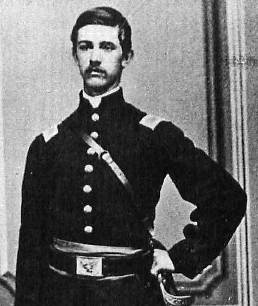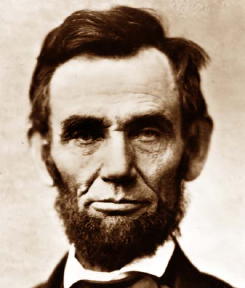Archive for January, 2010

First Lieutenant Luis F. Emilio became the Captain of Company E of the 54th Massachusetts on May 27, 1863. He was the only surviving field officer not incapacitated with wounds after the assault on Fort Wagner and became the Regiment’s acting commander. He fought through the entire war, until mustering out in March 1865. He published the first edition of his history of the 54th, A Brave Black Regiment, in 1891.
(From Luis F. Emilio, Brave Black Regiment [BBR, 1-2]):
At the close of the year 1862, the military situation was discouraging to the supporters of the Federal Government. We had been repulsed at Fredericksburg and at Vicksburg, and at tremendous cost had fought the battle of Stone River. Some sixty-five thousand troops would be discharged during the ensuing summer and fall. Volunteering was at a standstill. On the other hand, the Confederates, having filled their ranks, were never better fitted for conflict. Politically, the opposition had grown formidable, while the so-called “peace-faction” was strong, and active for mediation.In consequence of the situation, the arming of negroes, first determined upon in October, 1862, was fully adopted as a military measure; and President Lincoln, on Jan. 1, 1863, issued the Emancipation Proclamation. In September, 1862, General Butler began organizing the Louisiana Native Guards from free negroes. General Saxton, in the Department of the South, formed the First South Carolina from contrabands in October of the same year. Col. James Williams, in the summer of 1862, recruited the First Kansas Colored. After these regiments next came, in order of organization, the Fifty-fourth Massachusetts, which was the first raised in the Northern States east of the Mississippi River. Thenceforward the recruiting of colored troops, North and South, was rapidly pushed. As a result of the measure, 167 organizations of all arms, embracing 186,097 enlisted men of African descent, were mustered into the United States service.
By the President of the United States of America:
A Proclamation.
Whereas, on the twenty-second day of September, in the year of our Lord one thousand eight hundred and sixty-two, a proclamation was issued by the President of the United States, containing, among other things, the following, to wit:
“That on the first day of January, in the year of our Lord one thousand eight hundred and sixty-three, all persons held as slaves within any State or designated part of a State, the people whereof shall then be in rebellion against the United States, shall be then, thenceforward, and forever free; and the Executive Government of the United States, including the military and naval authority thereof, will recognize and maintain the freedom of such persons, and will do no act or acts to repress such persons, or any of them, in any efforts they may make for their actual freedom.
“That the Executive will, on the first day of January aforesaid, by proclamation, designate the States and parts of States, if any, in which the people thereof, respectively, shall then be in rebellion against the United States; and the fact that any State, or the people thereof, shall on that day be, in good faith, represented in the Congress of the United States by members chosen thereto at elections wherein a majority of the qualified voters of such State shall have participated, shall, in the absence of strong countervailing testimony, be deemed conclusive evidence that such State, and the people thereof, are not then in rebellion against the United States.”
Now, therefore I, Abraham Lincoln, President of the United States, by virtue of the power in me vested as Commander-in-Chief, of the Army and Navy of the United States in time of actual armed rebellion against the authority and government of the United States, and as a fit and necessary war measure for suppressing said rebellion, do, on this first day of January, in the year of our Lord one thousand eight hundred and sixty-three, and in accordance with my purpose so to do publicly proclaimed for the full period of one hundred days, from the day first above mentioned, order and designate as the States and parts of States wherein the people thereof respectively, are this day in rebellion against the United States, the following, to wit:
Arkansas, Texas, Louisiana, (except the Parishes of St. Bernard, Plaquemines, Jefferson, St. John, St. Charles, St. James Ascension, Assumption, Terrebonne, Lafourche, St. Mary, St. Martin, and Orleans, including the City of New Orleans) Mississippi, Alabama, Florida, Georgia, South Carolina, North Carolina, and Virginia, (except the forty-eight counties designated as West Virginia, and also the counties of Berkley, Accomac, Northampton, Elizabeth City, York, Princess Ann, and Norfolk, including the cities of Norfolk and Portsmouth[)], and which excepted parts, are for the present, left precisely as if this proclamation were not issued.
And by virtue of the power, and for the purpose aforesaid, I do order and declare that all persons held as slaves within said designated States, and parts of States, are, and henceforward shall be free; and that the Executive government of the United States, including the military and naval authorities thereof, will recognize and maintain the freedom of said persons.
And I hereby enjoin upon the people so declared to be free to abstain from all violence, unless in necessary self-defence; and I recommend to them that, in all cases when allowed, they labor faithfully for reasonable wages.
And I further declare and make known, that such persons of suitable condition, will be received into the armed service of the United States to garrison forts, positions, stations, and other places, and to man vessels of all sorts in said service.
And upon this act, sincerely believed to be an act of justice, warranted by the Constitution, upon military necessity, I invoke the considerate judgment of mankind, and the gracious favor of Almighty God.
In witness whereof, I have hereunto set my hand and caused the seal of the United States to be affixed.
Done at the City of Washington, this first day of January, in the year of our Lord one thousand eight hundred and sixty three, and of the Independence of the United States of America the eighty-seventh.
By the President: ABRAHAM LINCOLN
WILLIAM H. SEWARD, Secretary of State.
Original of the Emancipation Proclamation

